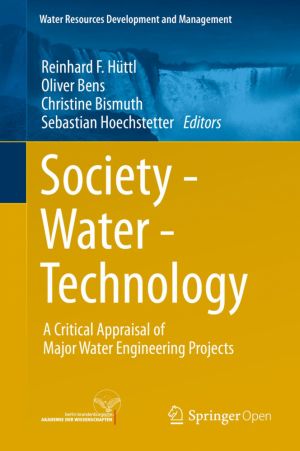Society - Water - Technology
A Critical Appraisal of Major Water Engineering Projects
by Reinhard Hüttl, Oliver Bens, Christine Bismuth, Sebastian Hoechstetter
DescriptionDetailsHashtagsReport an issue
This book presents the results of the Interdisciplinary Research Group "Society – Water – Technology" of the Berlin-Brandenburg Academy of Sciences and Humanities. It describes interdisciplinary evaluation criteria for major water engineering projects (MWEPs) and portrays an application to the Lower Jordan Valley (Middle East) and the Fergana Valley (Central Asia). Both areas are characterised by transboundary conflicts, by challenges due to demographic and climate change, and by political and societal pressures. Based on the findings, the book provides recommendations for science and political decisions makers as well as for international financing institutions. In addition, it outlines research gaps from an interdisciplinary perspective.In the past, MWEPs have been used as an instrument to cope with the demands of growing populations and to enhance development progress. Experiences with MWEPs have shown that a purely technical approach has not always brought about the desired results. In many cases, MWEPs have even resulted in negative implications for society and environment. Therefore, improved management strategies and enhanced technologies for a sustainable water resource management system are a prerequisite to meet present and future challenges. And, moreover, the continuous evaluation and optimisation of these measures is, likewise, a must. 






Book Description
This book presents the results of the Interdisciplinary Research Group "Society – Water – Technology" of the Berlin-Brandenburg Academy of Sciences and Humanities. It describes interdisciplinary evaluation criteria for major water engineering projects (MWEPs) and portrays an application to the Lower Jordan Valley (Middle East) and the Fergana Valley (Central Asia). Both areas are characterised by transboundary conflicts, by challenges due to demographic and climate change, and by political and societal pressures. Based on the findings, the book provides recommendations for science and political decisions makers as well as for international financing institutions. In addition, it outlines research gaps from an interdisciplinary perspective.In the past, MWEPs have been used as an instrument to cope with the demands of growing populations and to enhance development progress. Experiences with MWEPs have shown that a purely technical approach has not always brought about the desired results. In many cases, MWEPs have even resulted in negative implications for society and environment. Therefore, improved management strategies and enhanced technologies for a sustainable water resource management system are a prerequisite to meet present and future challenges. And, moreover, the continuous evaluation and optimisation of these measures is, likewise, a must.
This open book is licensed under a Creative Commons License (CC BY-NC). You can download Society - Water - Technology ebook for free in PDF format (9.4 MB).
Book Details
Title
Society - Water - Technology
Publisher
Springer
Published
2016
Pages
300
Edition
1
Language
English
ISBN13
9783319189703
ISBN10
3319189700
ISBN13 Digital
9783319189710
ISBN10 Digital
3319189719
PDF Size
9.4 MB
License

Related Books

Policy-making to address grand challenges faces greater complexity than any previous project of modernization. Future scenarios are haunted by uncertainty and there is real ambivalence as to the values that policy should strive for. In this situation decision-makers look to research and innovation to provide answers and solutions. But neither can t...
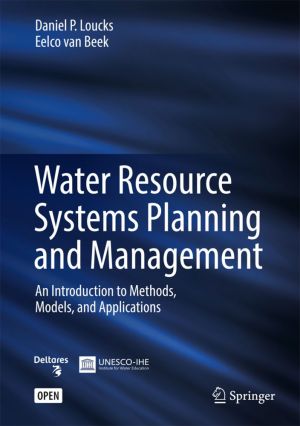
This revised, updated textbook presents a systems approach to the planning, management, and operation of water resources infrastructure in the environment. Previously published in 2005 by UNESCO and Deltares (Delft Hydraulics at the time), this new edition, written again with contributions from Jery R. Stedinger, Jozef P. M. Dijkman, and Monique T...
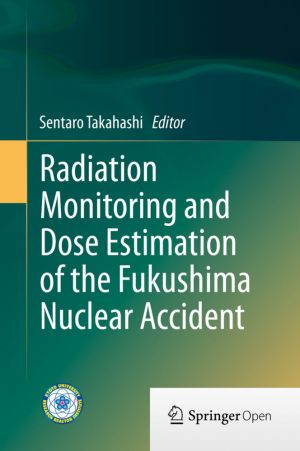
This book provides comprehensive research findings related to the environmental monitoring of radiation, levels of radioactive nuclides in various environments, and dose estimation in residents after the Fukushima nuclear power plant accident caused severe environmental contamination with radioactive nuclides. At the beginning of the book, a techni...
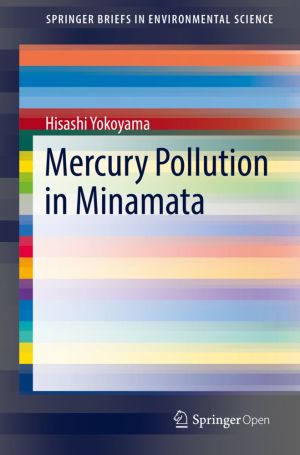
It overviews the poisoning which occurred in the 1950s and 1960s among the residents in Minamata who ate seafood contaminated with methylmercury discharged from the chemical factory, Chisso Corporation. It describes the history, symptoms pathogenesis and research on the causal agent, and discusses the responses of Chisso and the national and local ...
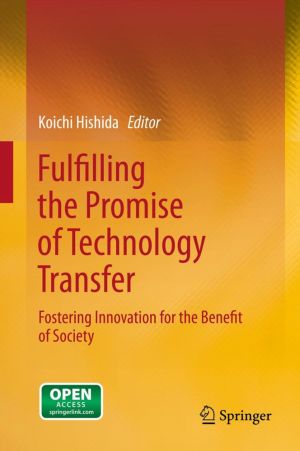
Universities and research institutes are increasingly expected to contribute to society by creating innovation from the returns of their research results and the establishment of new technologies. Toward that goal, Keio University in Japan held an international symposium titled "Fulfilling the Promise of Technology Transfer: Fostering Innovati...

This book focuses on the global cycles of energy, water and carbon, which are not only the essentials of our main energy carriers, the fossil fuels, but are also the building blocks of life. The book offers an overview of the basic scientific facts and relationships that are needed to understand today's energy generation and use, how they rela...

